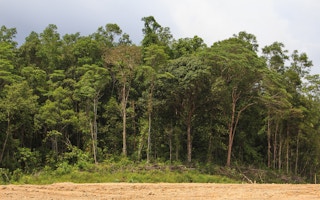In 2003, the EU agreed to work with countries like Indonesia to do something about the scourge of illegal logging, a devastating problem for tropical states whose vast rainforests were fast disappearing — often to feed Western markets.
Thirteen years later, the Southeast Asian nation is the set to become the first timber producer to certify its exports as legal under the EU’s anti-illegal-logging action plan, known as FLEGT, with the establishment of a licensing scheme for Indonesian shipments to Europe said to be only months away.
The announcement came last week during Indonesian president Joko Widodo’s visit to Brussels.
The EU and Indonesia are “ready to move towards the start of the first ever Forest Law Enforcement, Governance and Trade (FLEGT) licensing scheme on legally produced tropical timber,” the European Commission said in a release.
The annoucement lends credibility to the archipelago’s Timber Legality Assurance System (SVLK), which will be applied to ensure the legality of Indonesian exports under the FLEGT scheme, although watchdog groups say loopholes still remain.
“Although there remains a lot of work to do, the FLEGT process gives us grounds for cautious optimism that forest crime can be addressed effectively,” said Faith Doherty, forest campaigner with the Environmental Investigation Agency, a London-based NGO.
“Over the coming months, Indonesia still has some work to do on issues of transparency which we urge the Indonesian Government to address with the same extraordinary commitment it has shown in combating illegal logging and the associated illegal trade from Indonesia,” she added.
The archipelago is one of 15 countries to enter into a bilateral trade deal known as a Voluntary Partnership Agreement (VPA) with Europe under the FLEGT plan.
It remains unclear when the licensing scheme will take effect. Indonesia and the EU needed four years to negotiate a VPA, and two more to sign it.
From the time that the FLEGT plan was created, in 2003, to the Indonesian VPA’s 2014 ratification, Indonesia lost nearly $9 billion in state revenue from unreported timber sales, according to a recent investigation by the archipelago’s antigraft agency, the KPK.
Last week in Indonesia’s westernmost Aceh province, police arrested 14 men from whom they recovered more than 100 tons of illegally harvested, high-quality timber. The sophisticated operation employed chainsaws and bulldozers and had been bankrolled by a businessman in the nearby city of Medan, who was among the detained, according to authorities.
By value, Europe buys 11 per cent of Indonesian timber products and paper exports, and the archipelago supplies a third of the EU’s tropical timber imports, according to the European commission.
Eco-business published this story with permission from Mongabay.










